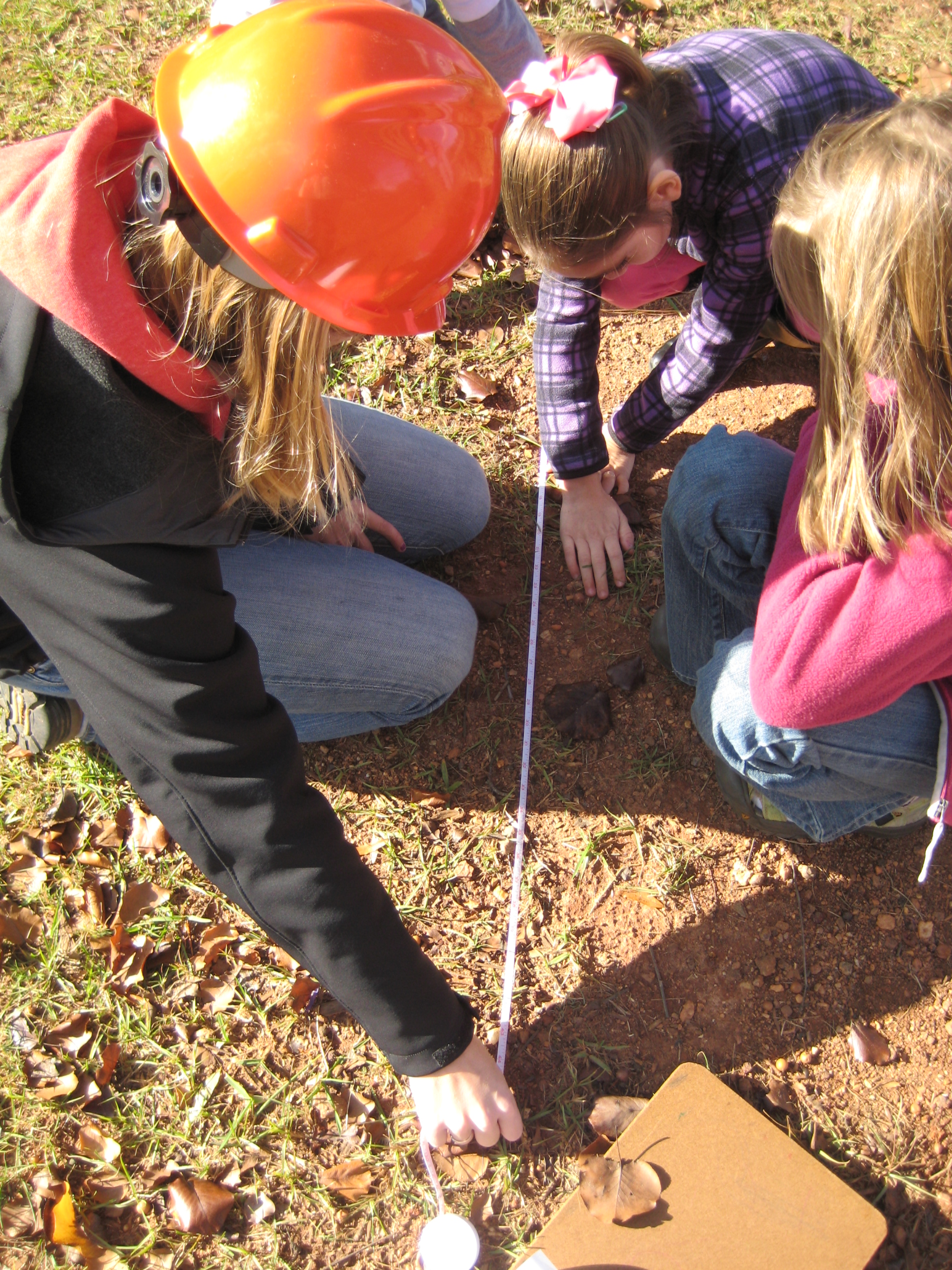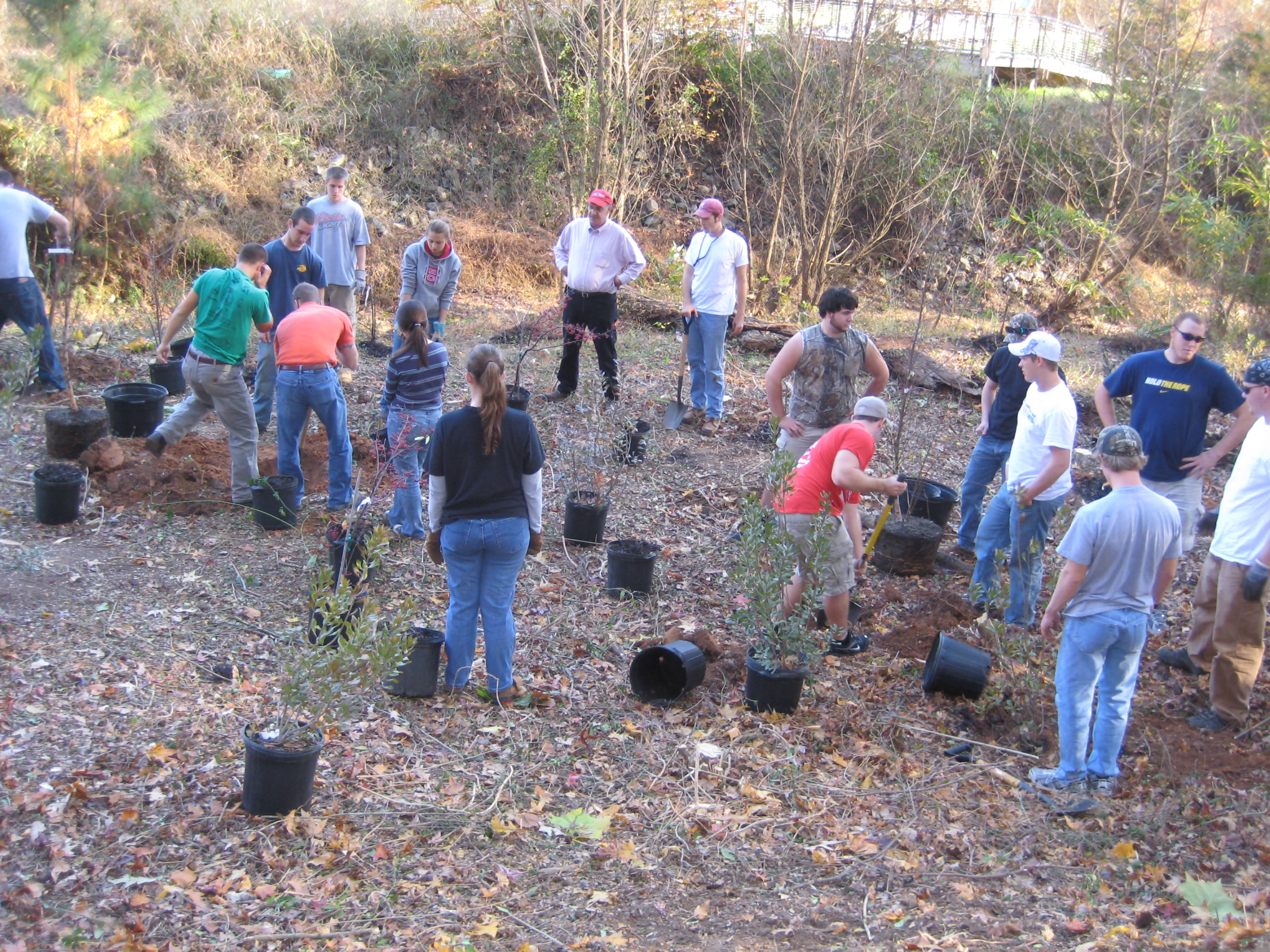
NCSU student teaches elementary school students how to measure using forestry techniques.
When you mix meaningful service in the community with experiences related to course curriculum, a powerful learning tool is created! Service-learning offers students a variety of opportunities to grow in their community involvement while examining their experiences, related to specific learning outcomes. Several faculty members in the NC State Department of Forestry & Environmental Resources have led their students through these service-learning experiences with significant positive outcomes from the perspectives of the community, faculty and students involved.
Last fall, numerous service-learning projects were incorporated into courses in the Department of Forestry and Environmental Resources. Some of these projects include:
Natural Resources 100 Introduction to Natural Resources —Led by Dr. Barry Goldfarb and Dr. Gary Blank, students divided into four group of 25 students to work at four different project sites. These students removed invasive species and plant native species. Through this experience, the students began to identify invasive species while learning the benefits of having native species while serving the community by improving the plant conditions at sites, including Centennial Campus and county-owned areas.
Forestry 784 The Practice of Environmental Impact Assessment—Led by Dr. Gary Blank, students created a general management plan for Lake Raleigh Woods on the Centennial Campus. Students assembled and evaluated information available about the preserve, surveyed faculty members about actual and potential use of the preserve, and investigated several questions and critical issues. Information gaps were filled and current conditions analyzed. The general management plan identifies priorities that need attention to protect values for which the preserve has been designated. NC State University administrators, the clients, subsequently named an advisory panel that will use this draft as a basis for moving forward.

NCSU students remove invasive species and plant native species.
Natural Resources 300 Natural Resources Measurements —Led by Dr. George Hess, students are developing a natural resource inventory of the Rust Property in collaboration with Wake County Parks, Recreation, & Open Space. The property is along Swift Creek and was purchased as protected open space by Wake County. The class’ inventory will provide baseline data, so the County can develop a management plan for the land. Students are developing information about soils, wildlife, plants, water, and the history of human use of the property.
Forestry 172 Forest System Mapping and Mensuration I —Led by Dr. Bronson Bullock, students worked with elementary and middle school students to teach them about forestry measurements and environmental education. These students took skills that they recently learned in this course and taught them to elementary and middle school students, so the younger srudents would have a practical application for the measuring skills they were learning in their classes. Dr. Bullock’s students lead this hands-on, fun activity giving the younger students the opportunity to get outside, enjoy their surroundings and grow in their appreciation for the environment.
Natural Resources 484 Environmental Impact Assessment – Led by Dr. Gary Blank, students spent a lab period collecting debris and flotsam from the riparian zone in Schenck Forest along Richlands Creek. The class accumulated a pick-up truck load of trash, recyclables, tires and other materials washed downstream from sources farther up in the watershed and tossed or blown off the Wade Avenue right of way. The NC State Sustainability Office assisted by providing collection bags, protective gloves, and the truck for hauling collected material for campus disposal.

NCSU student plants a native tree species.
Through all of these service-learning activities, students in the Department of Forestry and Environmental Resources are fulfilling NC State University’s founding principles as aland grant institution —providing extension and outreach to the community while growing in personal education. Faculty and students enjoy the opportunity to move outside of the classroom to learn in a variety of hands-on, meaningful experiences, and service-learning provides the perfect mix.
Service-Learning is an importnat academic component of the College of Natural Resources’ commitment to Learning Beyond the Classroom, and can be found in all three departments in the College.

